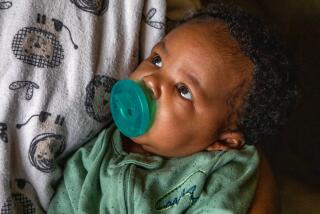Death in the neonatal ICU is increasingly peaceful, study suggests
- Share via
Most of the infants who die in neonatal intensive care units are ending their short lives peacefully, a new study suggests.
Not long ago, the reverse was true. In the late 1980s, most of the infants who died in NICUs were given CPR and other heroic – often invasive – measures right up to their last moments. Fewer than 20% died because their treatment was withdrawn, studies have established. A decade later, withdrawal of treatment preceded about 40% of all NICU deaths, according to other studies.
Doctors at Children’s Mercy Hospital and the University of Missouri in Kansas City wondered whether that trend had continued in over the last 10 years. They looked at the medical records of the 414 infants who died in the hospital’s NICU between Jan. 1, 1999, and Dec. 31, 2008. Patients were divided into three groups: babies born very prematurely (at least eight weeks early), babies born with congenital anomalies such as heart defects and “other” babies.
The researchers found that 62% of the babies died after their therapy was withdrawn. These included cases in which a ventilator, supplemental oxygen or feeding tube was removed, to name some of the most common examples. An additional 21% of infants died after such therapy was withheld. Only 17% of the neonatal patients died despite receiving CPR, they reported.
Over the 10-year period studied, the researchers found that the number of deaths in the NICU due to withheld treatment rose by about one per year. Most of that increase was due to doctors and families withholding care for very premature infants. The researchers couldn’t find any link between the mother’s age, the baby’s gender or the baby’s age and the likelihood that the infant would have care withdrawn or withheld.
The researchers hypothesized that the shift away from heroic measures for premature babies was influenced by position statements issued in 2000 and 2003 from the American Academy of Pediatrics and the Institute of Medicine that focused doctors’ attention on end-of-life issues for seriously ill infants.
“When death is imminent or medical care is considered futile, the goal is to provide a peaceful, controlled setting for the infant and family,” the researchers wrote. The diminished use of CPR, they added, “may suggest improvement in earlier recognition of medical futility and a desire to provide a peaceful death for the dying infant.”
The study was published in the July issue of Archives of Pediatric and Adolescent Medicine.







